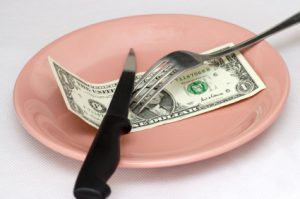
Source image
Michael Pollan’s In Defense of Food is no doubt an interesting read that pulls back the curtain on the modern world’s obsession with nutritionism. He illuminates where the food industry has seemingly herded the masses into a rabbit hole of misinformation and reductionist thinking. Pollan presents a solid argument into seeing food as a holistic, synergistic process that ties to our quality of health.
As a person who is fairly selective about what I consume, I invest time, effort and dollars into my diet. However…I can afford to. While Pollan makes a very convincing argument that we should all shop the perimeter of the market, he misses the very big point of the privilege it takes to do so. In working with nonprofits that use charity to feed those under-serviced, one experiences the vast divide of those that have and have not. Those that have the time, resources and funds to be able to prepare and eat the “perimeter” are vastly segregated from those whose primary concern is staying alive. What I think deserves more of the spotlight is why is it cheaper to buy a processed frozen meal than a fresher alternative? Why is there so little education around the synergistic effect of whole foods and plants in a balanced diet? How is it the norm that healthful eating should cost so much and be so much more difficult to achieve?
Food insecurity is an aptly named phenomenon. As a society in which we should care more about the sum of its parts, we should look more to the why of a culture’s food habits as opposed to “who.” The shame should be shifted to the industry that dictates what is cost effective for a family as opposed to what a family should be forced to prioritize. As our pocketbooks command so much power in our culture, those that have the heft should speak, and spend, for those that cannot.

You make such good points. A few years ago I worked at a food bank in Seattle and while most of the food was semi nutrition. A lot of it was canned goods think: beans, tomatoes, fruits. These people were thankful to receive the food they did because they couldn’t afford other food. Like you said some people are just concerned about staying alive.
I think Michael Pollan wrote a great book but you can tell he definitely wrote it for a certain audience. He wrote it for the people that can afford to perimeter shop and have more time and resources to be concerned with what goes into there body rather than people that are just trying to make it from day to day. He wrote a book focused at what the individual can/should do about their eating habits and I am sure the correct audience absolutely loves his book. Yep, just checked on Amazon and it has like a 4.7/5 stars and 1000+ reviews, so yes the correct audience loves it. However, you are right that the food industry should receive the blame for the way in which consumers eat. I think for many people it is easier to look at ourselves and what we are doing wrong/ right then try and figure out a whole system like the food industry but like me and you both said some people don’t have that luxury.
You bring up a very good point regarding Michael Pollan’s In Defense of Food, it is aimed at those who are privileged enough to have a choice in their food source. As you said, people who are concerned about feeding their families and staying alive don’t have the benefit of seeking out healthier alternatives. I am lucky enough to have the privilege to see out healthy options and it is not cheap. I enjoyed Michael Pollan’s book but perhaps that was because I viewed it as someone who has the means to better their diet and not someone who is simply trying to survive. I think that the question you ask about our culture’s food habits is reasonable, we should be more pointed in our criticism of practices that essentially force people to eat unhealthily because it is cheaper. Although, I am not sure an individualistic response of using our pocket books as our voice is the most beneficial. I think if we pair the individualistic response with lobbying our representation and taking a stand regarding policy then more could be accomplished.